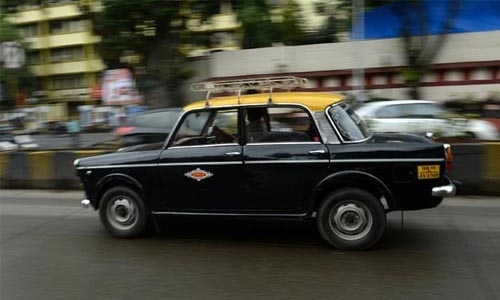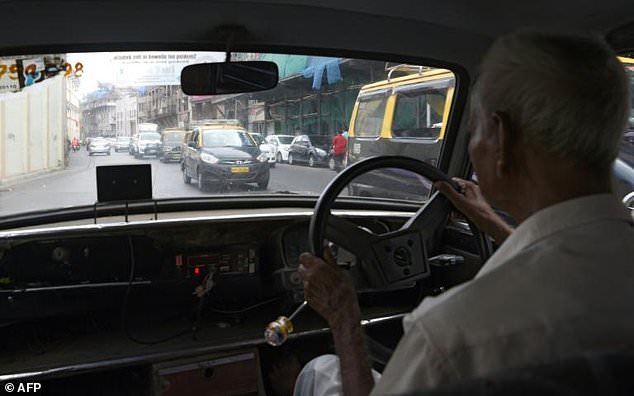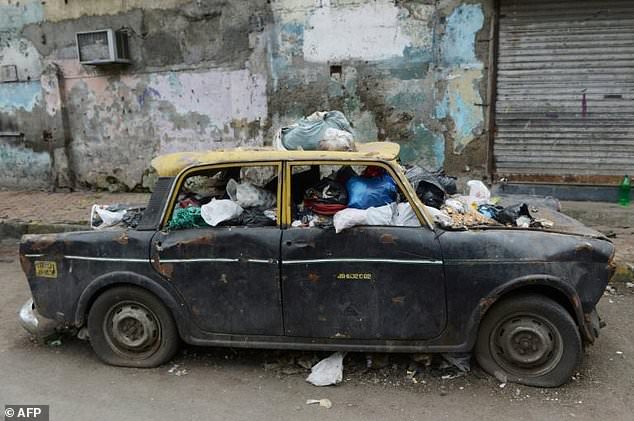Mumbai's adored Padmini taxis near the end of the road
Mumbai : They were named after a legendary Indian queen and were synonymous with Mumbai for half a century but the last Premier Padmini taxis will soon embark on their final journey -- to the scrapyard.
The compact black-and-yellow cabs, based on an Italian Fiat and often boasting elaborately patterned interiors, were once ubiquitous across the congested roads of India's financial capital and have featured in countless Bollywood movies.
Around 65,000 Padminis plied Mumbai at their peak in the mid-1990s but a gradual phasing out in favour of newer, more environmentally friendly vehicles has meant that today only some 300 splutter around and officials predict they will disappear completely next year.
For many the passing of the Indian-built vehicle, a product of the Asian giant's closed economy of the 1960s and a classic, albeit now rusting, car which continues to enthral foreign tourists, will be the end of an unforgettable chapter in Mumbai's history.
"It really is an iconic car because for so long it was the only vehicle used by taxi operators here. It must have been the largest fleet in the world," A. L. Quadros, a taxi union chief in Mumbai, told AFP.
The first Padminis, an Indian take on the Fiat 1100 Delight, rolled off production lines at the Premier Automobiles Limited factory in Mumbai, then called Bombay, in 1964 under an licensing agreement with the famous Italian car manufacturer.
They were initially known as "Fiat taxis" before being renamed Padmini in 1973 after mythical Hindu queen Rani Padmini who legend has it lived during the 13th and 14th centuries.
Padmini v Ambassador
Mumbai authorities in the 1960s opted for the Padmini over the bulkier Hindustan Motors Ambassador -- the taxi of choice in Delhi and Kolkata, which was the only other car widely available in India at the time -- and their numbers increased exponentially during the '70s and '80s.
"The Padmini was chosen because it was small and attractive. It was nice to drive and you could park it anywhere easily. It was comfortable and people liked it," said Quadros.
Not known for their speed or boot space, Padminis are characterised by their low ceilings, large gear stick to the left of the steering wheel and quirky silver-coloured door handles which require passengers to trickily lift up and push to get out.
Today, many have colourful carpeted ceilings and seat covers while some boast bright, multi-coloured neon lights which illuminate the inside of the cab at night.
But they are also known for dodgy brakes, indicators that fail to work, doors that don't close properly and a tendency to let in water during Mumbai's four-month summer monsoon.
As Autocar India editor Hormazd Sorabjee points out they were hardly famous for being finely-tuned automobiles.
"The welding was poor and sloppy. Even when it came out of the factory it was in terrible condition and you'd probably have to get it fixed. That's just how it was in India in those days," he told AFP, referring to the years before India's economy opened up in 1991.
Anti-pollution measures
Liberalisation paved the way for the arrival of more spacious, reliable, comfortable and fuel-efficient vehicles such as Hyundai models. Numbers steadily declined and production of Padminis was stopped altogether in 2000.
Their death knell was finally sounded in 2013 when the government implemented an anti-pollution order banning cars more than 20 years old from Mumbai's roads. The number of Padminis has declined rapidly since and Quadros expects there will be none left on the roads by December 2018.
Taxi driver Mukund Shukla, who has manoeuvred his Padmini through Mumbai's hectic streets for 20 years, is sad about the prospect of his beloved vehicle being sold for scrap.
"This Padmini has given me company for two decades and I will miss it deeply," said the 47-year-old, who plans to take a bank loan to afford the 500,000-rupee ($7,700) cost of a new taxi.
But not everyone is upset about the Premier Padmini fading into history.
Sorabjee said: "Modern cars are light years ahead in terms of technology. The Padmini had nothing going for it by the end, nostalgia apart."
Related Posts



